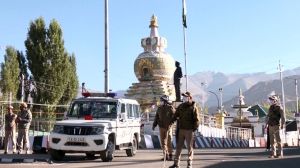The holy quota
The decision to introduce a constitutional amendment to enable states to re-impose reservations in unaided private colleges is deeply disapp...

The decision to introduce a constitutional amendment to enable states to re-impose reservations in unaided private colleges is deeply disappointing. This decision exemplifies almost all the ills that afflict our policies in higher education. In this sector we treat symptoms rather than causes. We stifle the sector by inappropriate regulation, and are blatantly hypocritical when it comes to providing opportunities for students from marginalised groups. Instead of a policy that will genuinely empower students from marginalised communities, we offer them tokenism.
In any democratic society, access to education must be widely distributed. No student who is capable and qualified should be deprived of education simply because of who they are or what their income is. Every student should have an opportunity to enhance their capabilities to the fullest extent possible; though this aspiration should not be confused with the claim that they will all turn out to be equal in the end. Education is about striving, excellence and above all distinction. A democratic society should be worried if opportunities are curtailed by class or caste. Given a random distribution of capabilities across classes and castes, that students from different groups are not adequately represented in higher education may be taken as indicative of the fact that they do not have access to opportunities. It is the obligation of the state and other institutions to engage in such affirmative action as might break down these barriers. But genuine affirmative action policies shouldn’t be confused with reservations, they can go beyond them.
Our approach to solving the problem of massive inequality in opportunity has been two fold: fee regulation and reservations. The proposed constitutional amendment enables states to reintroduce both in the wake of the Inamdar decision that took some bold steps towards liberating private initiative from the stranglehold of the state. But if we were honest, we should ask ourselves: has this combination of fee regulation and reservation served its purpose? Has it led to an expansion of high quality education for marginalised groups? The honest answer would be: no. There are better and more intelligent ways to serve the cause of SC/ST students, and the education system as a whole. We are innovating in every area of policy, but when it comes to education of Dalits we are mindlessly reverting to a formula that has been tried and has failed for fifty years. In doing so we are prepared to squelch the legitimate freedoms that educational innovators and entrepreneurs should enjoy if they are to create a vibrant system.
By some estimates, SC/ST students constitute almost ten per cent of the system of higher education as a whole, way below the quotas that are available for them. Proponents of reservation argue that this only shows that reservations have not been implemented. But this fact should lead us to draw a different conclusion. What this shows is that SC/ST students have not been given opportunities and resources at all levels of education. Instead of addressing the real cause of their deprivation, reservation is addressing only the symptoms. No wonder SC/ST representation in higher echelons of education remains meager. If the government were really serious about SC/ST empowerment, it would endow them with better schools, and better financial support that will make education truly accessible to them. It will not take huge resources to ensure that every eligible SC/ST student has access to good education. Proponents of reservation will argue that since it is unlikely that these measures will be put in place, reservations are the next best thing. But you can turn this argument on its head. It is precisely because we have been besotted by the politics of reservation that no genuinely effective resource allocations for Dalit education have taken place. And resources are not that hard to find: just a disinvestment of ten per cent of public sector enterprises would cover all the financial needs of Dalit students who enter higher education. Even more, if colleges knew that these students come with substantial resources, they would bend over backwards to educate them. Reservation does not open the doors to access; being armed with genuine resources does. Let our political class agree to a road map to increasing spending on education to six to eight per cent of GDP. Reservation is an insulting way of saying to Dalits: we won’t give you resources, and even if we did we are not confident that you could excel on your own. It is a shame that so many Dalit politicians are conniving with this ruse to keep Dalits separate and dependent.
We are concerned about the affordability of education. But again, our political class confuses symptoms with causes. The core problem in education is a supply side problem; price will come down only if supply increases. This can be addressed by strengthening the public system, which will remain the cornerstone of any system of higher education, and removing entry barriers for quality institutions. But since we don’t want to reform our public system we ask the private sector to carry our collective burden. This may be a good way for the middle class to assuage its guilt but it is not sensible policy.
Our entire regulatory structure encourages bad institutions rather than good ones, because if you do not give institutions three basic freedoms, whom to teach, what to teach and how to teach, you are not going to get good institutions. Inamdar was the beginning of recognition that these freedoms have to be restored to our educational institution. These freedoms may not be politically convenient but in the long run they will do far more to increase the supply of high quality institutions, even to marginalised communities, than the reinstitution of the license permit raj will.
Every political leader mouths the cliche that caste and community should become irrelevant to defining opportunities. This does not entail that we be blind to the ways in which caste and community structure oppression. But it is a truly dismal state of affairs when not one single politician has the courage to demand something more radical and honest, and something more compatible with a genuine freedom for all.
The writer is president, Centre for Policy Research. The views are personal



- 01
- 02
- 03
- 04
- 05




























